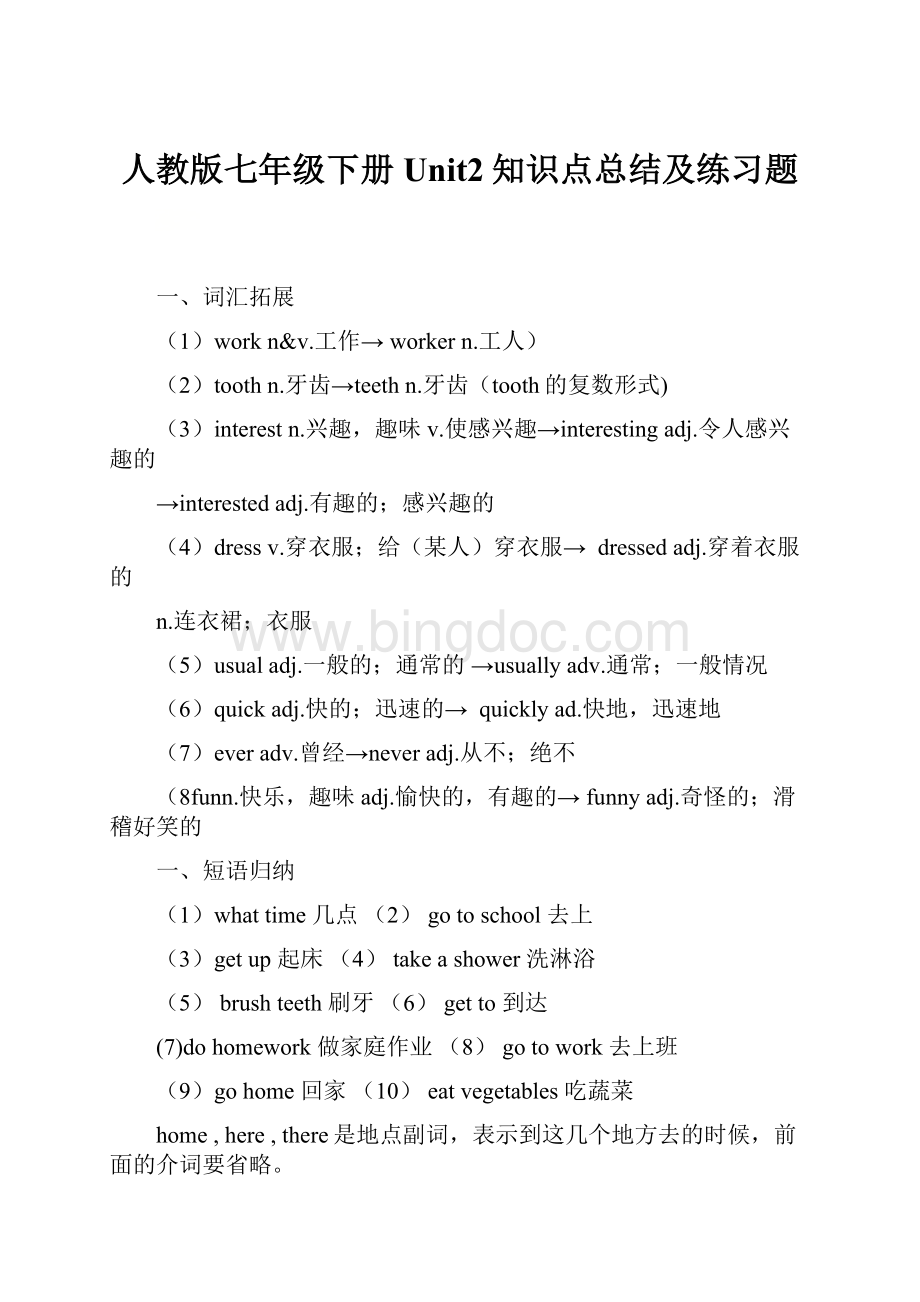人教版七年级下册Unit2知识点总结及练习题.docx
《人教版七年级下册Unit2知识点总结及练习题.docx》由会员分享,可在线阅读,更多相关《人教版七年级下册Unit2知识点总结及练习题.docx(11页珍藏版)》请在冰点文库上搜索。

人教版七年级下册Unit2知识点总结及练习题
一、词汇拓展
(1)workn&v.工作→workern.工人)
(2)toothn.牙齿→teethn.牙齿(tooth的复数形式)
(3)interestn.兴趣,趣味v.使感兴趣→interestingadj.令人感兴趣的
→interestedadj.有趣的;感兴趣的
(4)dressv.穿衣服;给(某人)穿衣服→dressedadj.穿着衣服的
n.连衣裙;衣服
(5)usualadj.一般的;通常的→usuallyadv.通常;一般情况
(6)quickadj.快的;迅速的→quicklyad.快地,迅速地
(7)everadv.曾经→neveradj.从不;绝不
(8funn.快乐,趣味adj.愉快的,有趣的→funnyadj.奇怪的;滑稽好笑的
一、短语归纳
(1)whattime几点
(2)gotoschool去上
(3)getup起床(4)takeashower洗淋浴
(5)brushteeth刷牙(6)getto到达
(7)dohomework做家庭作业(8)gotowork去上班
(9)gohome回家(10)eat vegetables 吃蔬菜
home,here,there是地点副词,表示到这几个地方去的时候,前面的介词要省略。
(11)from…to…从……到……(12)gethome到达家中
(13)either…or…要么…要么…(14)gotobed上床睡觉
(15)inthemorning/afternoon/evening在上午/下午/晚上
(16)atnight在夜间(17).lotsof=alotof=much=many许多,大量
(18).radiostation广播电台(19).atnight在晚上
(20).belatefor=arrivelatefor迟到(21playcomputergames玩电脑游戏
(22).gotoclass上课(23).come back 回来
(24).get/bedressedin+衣服名词或颜色名词表示穿着…衣服或…颜色的衣服=bein+颜色(穿戴…颜色衣服/帽子)
(25).dresssb.给某人穿衣/.dressoneself某人自己穿衣服/getdressed穿上衣服
(26).puton穿上(反义词takeoff)
(27).doone’shomework做家庭作业
(28)work at the radio station 在电台工作
(29)eat quickly 吃得快
(30)eat breakfast =havebreakfast/dinner/lunch吃早、晚、午饭
(31).takeashower洗淋浴澡
(32)belateforschool=cometoschoollate上学迟到了
(33)takeawalk=haveawalk=goforawalk散步
(34)go out for a walk出去散步
(35)brushone’steeth刷牙
(36)onschoolnights在上学的晚上
(37)do morning exercises 做早操/do eye exercises 做眼保健操
(38)keep healthy / be healthy / stay healthy / keep in good health 保持健康
(39) What do you do ?
=What are you ?
=What’s your job ?
你是干什么的?
(40)get up early 起得很早(41)play sports 做运动
(42) listento听…(43)unhealthy habits 不健康的习惯
(44)taste good味道很好
(45)have a very healthy life有一个健康的生活
(46)healthy activities 健康的活动
三、知识点whattime&when 引导的特殊疑问句
whattime和when都可以对时间状语进行提问,用来询问什么时间。
两者主要用法如下:
1.对做某事的具体时间点进行询问时,when和whattime均可用。
如:
—When/Whattimedoyougotoschool?
—Ateighto'clock.
2.对钟表显示的具体时间进行询问时,即询问几点几分时,只能用whattime。
如:
—Whattimeisit(now)?
=What'sthetime(now)?
(现在)几点了?
—It's8:
35.
3.对非具体时间点进行询问时,只能用when。
如:
—WhenisyourSchoolDay?
—It'sonSaturday.
四、知识点英语钟点时刻的表达
1.当时间是整点时,可用“钟点数+o'clock”来表达,其中o'clock可以省略。
如:
6:
00 → six(o'clock)
2.当时间不是整点时,表达方式有以下两种:
顺读法:
钟点数+分钟数。
如:
9:
08 → nineeight 14:
40 → fourteenforty
逆读法:
1)当分钟数小于30时,用“分钟数+past+钟点数”表示“几点过几分”。
如:
8:
09 → ninepasteight
2) 当分钟数大于30时,用“(60-分钟数)+to+下一个钟点数”表示“差几分到几点”。
如:
11:
40 → twentytotwelve
3)当分钟数是30分时,用halfpast+钟点数,表示“几点半”。
如:
1:
30 → halfpastone
4)15分钟还可以用aquarter表示。
如:
11:
15 → aquarterpasteleven8:
45 → aquartertonine
3.具体时间前面用介词at。
五、知识点词语辨析:
family;house;home的用法:
★family的意思是“家庭、家庭成员”,与居住的房子无关。
强调家庭成员。
当family作为整体概念的“家庭”讲时是单数;当“家庭成员”讲时,以单数形式当复数用,谓语动词则用复数,如:
MrRichard’sfamilyisverylarge.理查德先生家里的人很多(单数)
Myfamilyareverywell.我家里人都很好。
(复数)
★house的意思是“房屋、住宅”,一般对家人所居住的建筑物而言。
如:
Therearemanynewhousesinourvillage.我们村里有很多新房子。
★home的意思是“家”,主要指一个人出生或居住的地方,房屋是其中的一部分,因而也有“家乡、故乡”的意思,它具有house所没有的感情色彩(如“团聚”、“思念”等),侧重个人出生、被抚养的环境和居住地点。
如:
EastorWest,homeisbest.(金窝银窝不如自己的草窝。
)
六、知识点词语辨析:
job;work的用法:
★work作不可数名词,有体力或脑力劳动的意思,也可以做动词用。
Youhavedoneaday'sworkinthreehours.
Thechildrenwereatschool,myhusbandwasatworkandthehousewasquiet.孩子们上学去了,我丈夫去上班了,所以家里很安静。
Heisnowoutofwork.他现在失业了。
★job作为“工作”解,job是可数名词。
如:
Whenyoustartajob,youmuststicktoit.一旦你开始了一件工作,他就得持之以恒。
七、知识点词语辨析:
listento,hear和sound的用法:
△listento意为“注意听”,表示有意识地去听,但不一定听得见什么,强调听的动作。
(listen不及物,listento及物)
如:
Theyarelisteningtotheteacher.他们在听老师说。
△hear意为“听见”,表示耳朵里听到了,但不一定有意识地听,强调听的结果。
如:
I’msorrytohearthat.听到那个消息我很难过。
△sound意为“听起来,听上去”,可作连系动词,后接形容词作表语,还可以和like连用。
例如:
Themusicsoundssweet.这音乐听起来悦耳。
八、知识点
频度副词是副词的一种,在初中阶段常用即always, usually,often,sometimes,never现将它们的用法归纳如下:
1. always是频度最大的词,意为"总是;永远"。
如:
I shall always remember my first day at school.
2. usually意为"通常",即很少例外,频度仅次于always。
如:
What do you usually have for breakfast?
你通常早餐吃什么?
3. often意为"经常",在频度上不如usually那么频繁。
如:
Li Ping often does his homework in the afternoon.李平经常在下午做作业。
4.sometimes意为"有时候",频度比often小,表示动作偶尔发生,间断较大。
如:
1.I sometimes go to the library.我有时去图书馆。
2.Sometimes I read a book in the evening.我有时在晚上看书。
5.never从不
九、知识点一般现在时。
(语法重点)
㈠一般现在时态的意义是:
1.表示现在的特征或状态。
如:
Heisathometoday.他今天在家。
2.表示经常性、习惯性的动作。
常和频率副词always,often,usually及everyday等表示时间的短语连用。
如:
I go to school at 7:
00 every day. 我每天7点钟去上学。
3.表示主语具备的性格或能力。
如:
She likes pears very much. 她非常喜欢梨子。
They speak English. 他们讲英语。
㈡ 肯定陈述句:
当主语是第一、二和第三人称复数时,谓语动词用原形。
当主语是第三人称单数时,谓语动词用第三人称单数形式。
例如:
①They stay at home on Sundays. 他们星期天呆在家。
②He does his homework in the evening. 他在晚上做作业。
㈢否定句:
当主语是第一、二及第三人称复数时,否定句借助助动词do+not,当主语是第三人称单数时,否定句借用does+not,并将动词第三人称单数还原。
例如:
①They don’t stay at home on Sundays. 他们星期天不呆在家里。
②Hedoesn’t do his homework in the evening. 他晚上不做作业。
㈣疑问句:
当主语是第一、第二及第三人称复数时,疑问句在句首加Do。
当主语是第三人称单数时,疑问句在句首加Does,并把谓语第三人称单数还原。
例如:
①Do they stay at home on Sundays?
他们星期天呆在家吗?
②Does he do his homework in the evening?
他晚上做作业吗?
练习题:
一、用所词给的适当形式填空。
1.Mysisterisveryyoung(幼小的).Shecan’tbrushher(she)teeth.
2.Hisparentsgo(go)toworkateighteverymorning.
3.LiuDehuaisafamoussingerandhehas(have)lotsoffans.(歌迷)
4.Thatgreatwriter(作家)oftenworks(work)allnight.
5.Let's_go___(go)home.It'salittlelate.
6.Eitheryouorhe___is_____(be)wrong.
7.Tomoftengetsupinthemorning,sohehasa__quick_____breakfastandgoestoschool__quickly________(quickly).
8.Thiskindoffruittastesvery____good________(well).
9.Lucyisonlytwoyearsold.Shecan’tget__dressed____(dress).
10.—what___does___Jack_do_____(do)onSundayevening?
—HeusuallywatchesTVwithhisparents.
11.Mygrandpacan’teatbeansnow.Hedoesn’thavestrong_teeth______(tooth).
12.Iknowa____funny_____(fun)story.Letmetellyou.
13.Myparentsusually_exercise________(exercise)onweekends.
二、单项选择
(B)1.—Doyouknowthe______?
—Yes,it’s10:
30.
A.age B.time C.number D.address
(C)2.Whatdoyouusuallydo______Sundaymorning?
A.to B.at C.on D.in
(D)3.It’steno’clockintheevening.Let’s_______________.
A.gotoschoolB.getupC.havelunchD.gotobed
(B)4.Thelittleboy__________everymorning.
A.brusheshistoothB.brusheshisteeth
C.brushhistoothD.brushhisteeth
(C)5.—___________Johnoften__________school?
—No,heisn’t.
A.Does;lateforB.Is;latetoC.Is;lateforD.Does;lateto
(B)6.Igaveher_____addressandshegaveme______.
A.my;herB.my;hersC.mine;herD.mine;hers
(B)7.She’s_____________girl.
A.anfifteen-years-oldB.afifteen-year-oldC.afifteen-years-oldD.anfifteen-year-old
(D)8.Myfatherdoesn’tlikemilk.Mymotherdoesn’tlikemilk,_______.
A.tooB.alsoC.orD.either
(C)9.Healwaysgetsupearlyeverymorning,soheis________lateforschool.
A.always B.usually C.never D.often
(A)10.—________doyouhavesupper?
—At7:
00.
A.When B.Where C.What D.How
(A)11.Doingexerciseeverydayisgood______yourhealth.
A.forB.atC.withD.in
(A)12.WhattimedoesLinda_______afterschool?
A.doherhomeworkB.doesherhomework
C.doherhomeworksD.doesherhomeworks
(B)13.Theyoftenhavelunch_______12:
00.
A.inB.atC.onD.for
(B)14.Whendoyou________everyday?
A.gotohomeB.gohomeC.goahomeD.gotothehome
(D)15.Doingsportsisgood______yourhealth.
A.inB.atC.onD.for
(A)16.Shewants_____anorange.
AtoeatB.eatingC.eatD.eats
(C)17._____Mike_____hishomeworkintheevening?
A.Do;doB.Do;doesC.Does;doD.Does;/
(B)18.Dicknevereatsvegetables,sothisisnota_____life.
A.happyB.healthyC.interestingD.sad
(B)19.Igohome____5:
30theafternoon.
A.at;onB.at;inC.at;atD.in;/
(C)20.He_____hishomeworkonSundays.
Adoesn’tB.don'tdoC.doesn'tdoD.don't
(B)21.—Doesthehamburger_____good?
—Yes.Iwanttoeatanother(另一个)one.
A.lookB.tasteC.soundD.make
(A)22.Fruitandvegetablesaregood_____me.Ieatthemeveryday.
A.forB.withC.atD.to
(B)23.I’msorryyoucan’t_____becausewehavenowater(水)now.
A.getupB.takeashowerC.takeawalkD.gotobed
(C)24.Doingexercise________goodforyourhealth.
A.beB.amC.isD.are
(B)25.Thevegetablesoup__________delicious.Canihavemore?
A.looksB.tastesC.soundsD.feels
(B)26.Hi,Jane.Whattimedoyougetup________weekdays?
-Iusuallygetup_______aboutsixo’clock.
A.in,at B.on;atC.at;at D.on;on
(D)27.Ihaveanew________.Soihavesomuch________todo.
A.workjobB.workat,workC.job;jobD.job;work
(D)28.________theafternoonofJune2nd,manyforeignersarrived______Shanghai.
A. In;at B. On;to C. In;in D.On;in
(B)29.Youneedtobrushyour_________after_________.
A. tooth;eat B. teeth;eating C. teeth;eat D. tooth;eating
(C)30—Doyouoftengotothegym?
—No,_____.Idon'likesportsatall.
A.alwaysB.usuallyC.neverD.often
㈢完形填空。
通读下面短文,掌握其大意,然后在各题所给的四个选项中,选出一个最佳答案,并将其字母编号写在题号前的括号内。
I’mamiddleschoolstudent.Ithinkmylifeisn’treally__31______.Letmetellyou__32___it.
IgotoschoolfromMondaytoFriday.I___33____getupbefore7:
30inthemorning,becauseIalwaysgotobedlateatnight.Aftergettingup,Iwashmyfaceandbrushteeth.
I___34_____ahealthybreakfastat7:
40.At8:
00,Iwalktothebusstop.Itakea___35____toschool.Ittakes__36______20minutestogetthere.Schoolfinishesat14:
30.WhenIgethome,Idomy____37______andstu